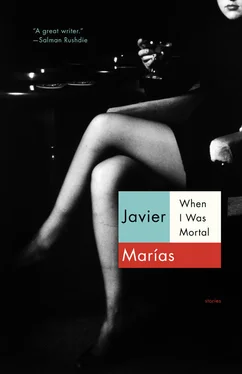Javier Marias - When I Was Mortal
Здесь есть возможность читать онлайн «Javier Marias - When I Was Mortal» весь текст электронной книги совершенно бесплатно (целиком полную версию без сокращений). В некоторых случаях можно слушать аудио, скачать через торрент в формате fb2 и присутствует краткое содержание. Год выпуска: 2012, Издательство: Vintage Espanol, Жанр: Современная проза, на английском языке. Описание произведения, (предисловие) а так же отзывы посетителей доступны на портале библиотеки ЛибКат.
- Название:When I Was Mortal
- Автор:
- Издательство:Vintage Espanol
- Жанр:
- Год:2012
- ISBN:нет данных
- Рейтинг книги:3 / 5. Голосов: 1
-
Избранное:Добавить в избранное
- Отзывы:
-
Ваша оценка:
- 60
- 1
- 2
- 3
- 4
- 5
When I Was Mortal: краткое содержание, описание и аннотация
Предлагаем к чтению аннотацию, описание, краткое содержание или предисловие (зависит от того, что написал сам автор книги «When I Was Mortal»). Если вы не нашли необходимую информацию о книге — напишите в комментариях, мы постараемся отыскать её.
. Plots turn on curious exigencies — a woman about to star in her first porn film; a night doctor who adds new meaning to "specialist"; a ghost whose neglect is greatly resented. "In the space of ten or twenty pages," as the
remarked, "Marías contrives to write a novel." "The short story fits Marías like a glove," as
noted, and these stories have been acclaimed as "dazzling" (
); "formidably intelligent" (
); and "startling" (
).
When I Was Mortal — читать онлайн бесплатно полную книгу (весь текст) целиком
Ниже представлен текст книги, разбитый по страницам. Система сохранения места последней прочитанной страницы, позволяет с удобством читать онлайн бесплатно книгу «When I Was Mortal», без необходимости каждый раз заново искать на чём Вы остановились. Поставьте закладку, и сможете в любой момент перейти на страницу, на которой закончили чтение.
Интервал:
Закладка:
I see this now and I see the whole thing, with an afterwards and a before, although the afterwards does not, strictly speaking, concern me and is therefore not so painful. But the before is, or rather the rebuttal of what I glimpsed and half-thought between the lowering and the raising and the lowering again of the black thing that finished me off. Now I can see Luisa talking to a man I don’t know and who has a moustache like the one Dr Arranz wore in his day, not a slim moustache, though, but soft and thick and with a few grey hairs. He’s middle-aged, as I was and as perhaps Luisa was, although she always seemed young to me, just as my parents or Arranz never did. They are in the living room of an unfamiliar apartment, his apartment, a ramshackle place, full of books and paintings and ornaments, a very mannered apartment. The man is called Manolo Reyna and he has enough money never to have to dirty his hands. It is the afternoon and they are sitting on a sofa, talking in whispers, and at that moment I am visiting María, two weeks before my death on the return from a trip, and that trip has still not begun, they are still making their preparations. The whispers are clearly audible, they have a degree of reality which seems incongruous now, not with my current non-tactile state, but with life itself, in which nothing is ever quite so concrete, in which nothing ever breathes quite so much. There is a moment, though, when Luisa raises her voice, like someone raising their voice to defend themselves or to defend someone else, and what she says is this:
“But he’s always been so good to me, I’ve nothing to reproach him with, and that’s what’s so difficult.”
And Manolo Reyna answers slowly:
“It wouldn’t be any easier or any more difficult if he had made your life impossible. When it comes to killing someone, it doesn’t matter any more what they’ve done, it always seems an extreme response to any kind of behaviour.”
I see Luisa put her thumb to her mouth and bite it a little, a gesture I’ve so often seen her make when she’s uncertain, or, rather, before making a decision. It’s a trivial gesture and it’s unseemly that it should also appear in the midst of a conversation we were not party to, the one that takes place behind our backs and mentions us or criticizes us or even defends us, or judges us and condemns us to death.
“Well, you kill him, then; you can’t expect me to do anything that extreme.”
Now I see that the person standing next to my television set — still on — and wielding the black thing is not Luisa, nor even Manolo Reyna with his folkloric name, but someone contracted and paid to do it, to strike me twice on the forehead, the word is assassin, in the war a lot of militiamen were used for such purposes. My assassin hits me twice and does so quite dispassionately, and that death no longer seems to me just or appropriate or, of course, compassionate, as life usually is, and as mine was. The black thing is a hammer with a wooden shaft and an iron head, a common-or-garden hammer. It belongs in my apartment, I recognize it.
There where time passes and flows, a lot of time has gone by, so much so that no one whom I knew or met or pitied or loved remains. Each one of them, I suppose, will return unnoticed to that space in which forgotten times past accumulate, and they will see only strangers, new men and women who, like children, believe that the world began with their birth and there’s no point asking them about our past, erased existence. Now Luisa will remember and will know everything that she did not know in life or at my death. I cannot speak now of nights and days, everything has been levelled out without resort to effort or routine, a routine in which I can say that I knew, above all, peace and contentment: when I was mortal, all that time ago, in that place where there still is time.
EVERYTHING BAD COMES BACK
For the night doctor
,
who did not want to remain fictitious
TODAY I RECEIVED a letter that reminded me of a friend. It was written by a woman unknown both to myself and to that friend.
I met him fifteen or sixteen years ago and — for no other reason than that he died — stopped seeing him two years ago, not that we ever saw each other with any frequency, given that he lived in Paris and I in Madrid. Although he visited my city only rarely, I used to visit his quite often. However, we first met in neither of those two cities, but in Barcelona, and before that meeting, I had previously read a book of his sent to me by a Madrid publishing house I used to work for as a reader (work, as is usually the case, that was poorly remunerated). There was little likelihood of this novel, or whatever it was, ever being published and I can remember almost nothing about it, except that it revealed a certain inventiveness with words, a strong rhythmic sense and a broad culture (for example, the author knew the word “wrack”) but apart from that it was more or less unintelligible, at least to me. Were I a critic, I would have described him as out-Joycing Joyce, though he was less puerile, or perhaps senile, than the later Joyce, to which his own work bore only a remote resemblance. Nevertheless, I recommended the book for publication and expressed my qualified regard for it in my report. His agent subsequently phoned me (for this writer, whose true vocation seemed to be to remain forever unpublished, nonetheless had an agent) to arrange a meeting to coincide with a trip his client would be making to Barcelona, where his family lived and where, fifteen or sixteen years ago, I too was living.
His name was Xavier Comella and I never did ascertain whether the business to which he sometimes referred vaguely as “the family business” was in fact the chain of clothes shops of the same name in Barcelona (selling mainly sweaters). Given the iconoclastic nature of his writing, I was expecting some wild, bearded individual, some kind of visionary with a penchant for pendants and vaguely Polynesian clothes, but he wasn’t like that at all. The man who emerged from the exit of the Metro at Tibidabo, where we’d arranged to meet, was only slightly older than myself, I was about twenty-eight or twenty-nine at the time, and much better dressed (I’m a very neat person myself, but he was wearing a tie — with a small knot — and cufflinks, unusual in men of our age and particularly so then); and he had an extraordinarily old-fashioned face, a face — like his writing — straight out of the interwar period. He wore his slightly wavy, blondish hair combed back, like a fighter pilot or a French actor in a black-and-white movie — Gérard Philipe or the young Jean Marais — and his sherry-brown eyes had a small dark fleck in the white of the left one, which gave his gaze a wounded look. He had good, robust teeth and a well-defined jaw so firm it gave the impression of being permanently clenched. His very prominent cranium, the bones of which were clearly visible beneath the smooth brow, always seemed on the point of exploding, not because of its unusual size, but because the taut skin over the frontal bone seemed incapable of containing it, or perhaps that was just the effect of the two vertical veins at his temples that seemed somehow too protuberant, too blue. He was good-looking, genial and, moreover, extraordinarily polite, especially for a man of his age and given the rather boorish times we lived in. He was one of those men you know you will never be able to confide in, but one in whom you can confidently trust. He had a studiedly foreign, or rather, extraterritorial look about him that only emphasized his estrangement from the times he’d been born into, a look acquired no doubt during the seven or eight years he’d spent out of Spain. He spoke Spanish with the attractive pronunciation of Catalans who have never actually spoken much Catalan (with soft c’s and z’s, soft g’s and j’s) and with the slight hint of a stammer at the beginning of sentences, occasionally stumbling over the first three or four words, as if he had to perform some minor mental act of translation. He could speak and read several languages, including Latin, in fact he mentioned that he’d been reading Ovid’s Tristia on the plane from Paris, and he said this without a trace of pedantry but rather with the satisfaction of one who has mastered some difficult task. He possessed a certain degree of worldly wisdom which he enjoyed showing off; during the long conversation we had in the bar of a nearby hotel, we talked almost exclusively about literature and painting and music, that is, about highly forgettable things, but he did tell me something of his life, about which he always spoke — on that occasion and during all the years we knew each other — with a contradictory blend of discretion and shamelessness. By that I mean that he was prepared to reveal everything or nearly everything, even about very intimate matters, but he always did so with a kind of grave artlessness — or was it perhaps tact? — which, in a way, diminished their importance, like someone who considers that all the strange, sad, terrible, agonizing things that happen to him are perfectly normal, a fate shared by everyone and so, presumably, by the person listening, who will not, therefore, be surprised by what he hears. Not that Xavier eschewed the confessional gesture, but he resorted to it, perhaps, more because he saw it as part of the gestural repertoire of the tormented than because he had any real awareness of what is, at least in principle, untenable. On that first occasion, he told me the following: he’d studied medicine but never practised as a doctor, instead living a life dedicated entirely to literature, funded by a generous inheritance or by some kind of private income, possibly — I can’t quite remember now — from a grandfather who owned a textile factory. Whatever the origin of the money, he enjoyed the use of it and had lived off it for the seven or eight years he’d spent in Paris — a move indeed made possible by that money — fleeing from what he considered to be the mediocrity and flaccidity of intellectual life in Barcelona, which, given how young he was when he left, he really only knew about through the press. (Although he grew up in Barcelona, he was born in Madrid, where his mother came from.)
Читать дальшеИнтервал:
Закладка:
Похожие книги на «When I Was Mortal»
Представляем Вашему вниманию похожие книги на «When I Was Mortal» списком для выбора. Мы отобрали схожую по названию и смыслу литературу в надежде предоставить читателям больше вариантов отыскать новые, интересные, ещё непрочитанные произведения.
Обсуждение, отзывы о книге «When I Was Mortal» и просто собственные мнения читателей. Оставьте ваши комментарии, напишите, что Вы думаете о произведении, его смысле или главных героях. Укажите что конкретно понравилось, а что нет, и почему Вы так считаете.












